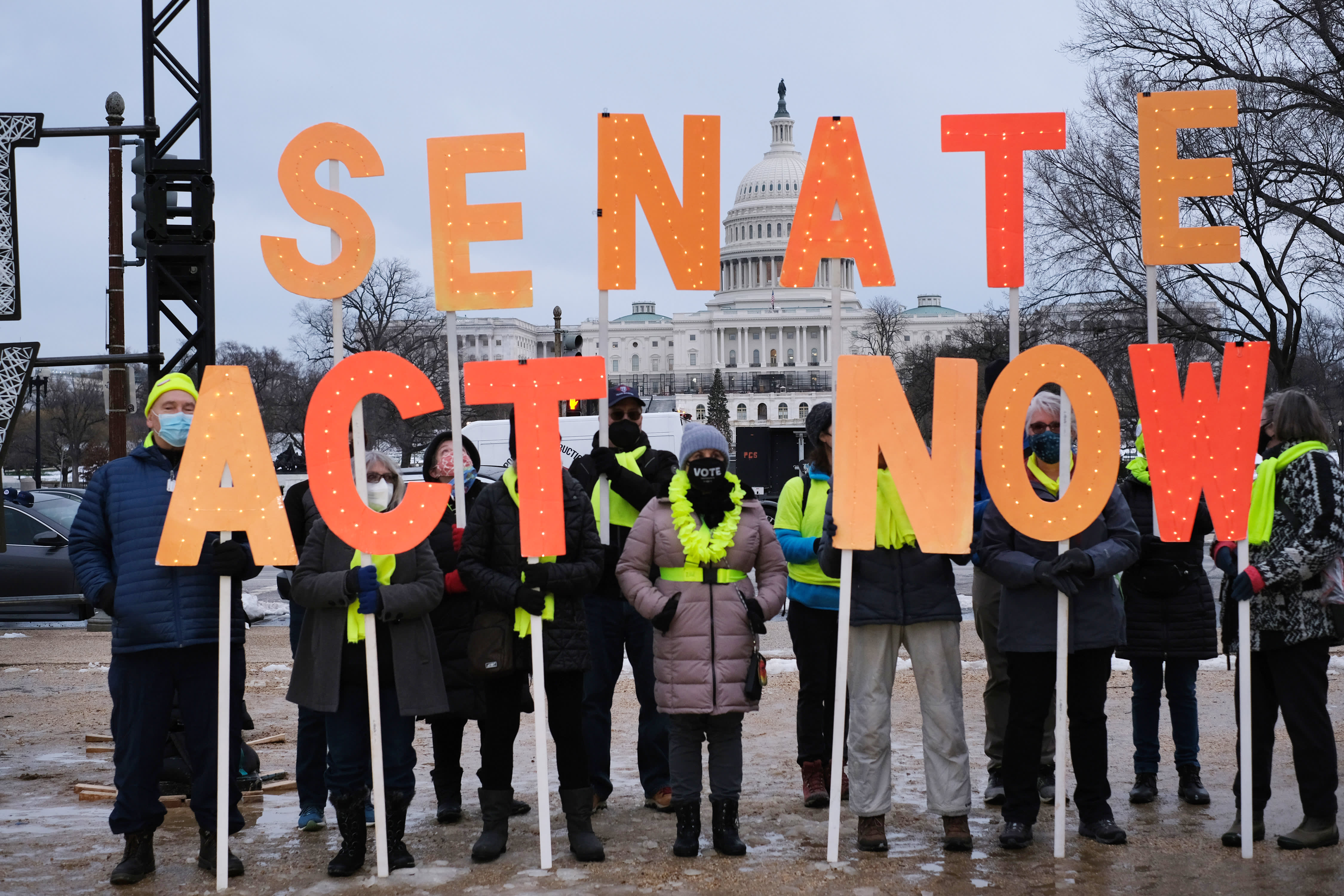Senate Majority Leader Chuck Schumer delayed votes on a pair of voting rights bills late Thursday, pushing back a debate over the chamber’s rules that will decide the fate of election reforms the party sees as vital to protecting U.S. democracy.
The New York Democrat said the chamber would not take up the legislation until Tuesday, citing “the circumstances regarding Covid and another potentially hazardous winter storm” approaching Washington, D.C. Sen. Brian Schatz, D-Hawaii, announced a positive Covid-19 test on Thursday. Democrats will lack a simple majority until he can return to the evenly split Senate.
“Make no mistake, the United States Senate will — for the first time this Congress — debate voting rights legislation beginning on Tuesday,” Schumer said Thursday night. “Members of this chamber were elected to debate and to vote, particularly on an issue as vital to the beating heart of our democracy as this one. And we will proceed.”
Republicans plan to block two proposals, known as the Freedom to Vote Act and the John Lewis Voting Rights Advancement Act. Once the bills fail, Democrats plan to consider ways to bypass the filibuster and push the proposals through with a simple majority.
The strategy appears doomed. While all Senate Democrats have signed on to the elections legislation, at least two — Joe Manchin of West Virginia and Kyrsten Sinema of Arizona — have said they will not back the filibuster changes needed to pass it. Under current rules, Democrats need at least 10 Republicans to pass most legislation.
“Eliminating the 60-vote threshold on a party line with the thinnest of possible majorities to pass these bills that I support will not guarantee that we prevent demagogues from winning office,” Sinema said Thursday as she reiterated her stance.
If the two centrist senators hold firm on rules changes, it appears all but impossible for Democrats to pass a series of reforms they see as critical to protecting ballot access. Provisions in the bills would expand early and mail-in voting, make automatic voter registration the national standard, enshrine Election Day as a national holiday and restore parts of the Voting Rights Act of 1965 gutted by the Supreme Court.
It is unclear now how Democrats will proceed if they fail to scrap the filibuster. Some Republicans have sounded open to reforming the Electoral Count Act of 1887 to make it harder for local officials to subvert election results.
The possibility emerged last year as certain GOP officials championed former President Donald Trump’s push to overturn swing-state presidential election results based on false conspiracy theories that widespread fraud caused his loss to President Joe Biden.
Many Democrats have called vote-counting reforms inadequate without changes to give more people access to the ballot in the first place. But making it harder to overturn results may become one of the only options left if their preferred bills fail.
Democrats have tried and failed to pass elections bills several times in the last year as Trump’s election lies spurred the Jan. 6 Capitol attack and contributed to the passage of restrictive voting laws in states such as Texas and Georgia. A year after a pro-Trump mob invaded the Capitol while Congress counted Biden’s victory, the president in a pair of speeches this month depicted a democracy under threat and pressured the Senate to change its rules to protect elections.
Biden met with Manchin and Sinema for more than an hour Thursday evening. They had “a candid and respectful exchange of views about voting rights,” a White House official said.
The president met with Senate Democrats earlier in the day and sounded pessimistic about his party’s chances of passing voting rights bills.
“I hope we can get this done,” Biden said. “The honest to God answer is, I don’t know whether we can get this done.”
Senate realities have signaled the bills would fail. But Democrats wanted to show their voters an effort to pass reforms after Trump tried to overturn the election and state legislatures passed laws that could disproportionately hurt voters of color.
Republicans have contended the Democratic bills would go too far. They have said the plans would give the federal government too much control over state elections.
Congress has passed legislation to protect voting rights in the past, most notably the Voting Rights Act that Democrats aim to restore.
The GOP has also cast exceptions to the filibuster as a fundamental change to the Senate’s function that would make lawmakers less likely to find consensus.
“There is a path forward for my Democratic colleagues to respond to the country they have so badly disappointed,” Senate Minority Leader Mitch McConnell said Thursday. “It isn’t to try to break the Senate and rewrite election laws. It’s to actually start tackling the issues that American families need tackled.”
As he stared down the voting rights legislation’s likely failure, Biden pledged to keep trying to protect ballot access.
“Like every other major civil rights bill that came along, if we miss the first time, we can come back and try it a second time,” he said. “We missed this time.”
